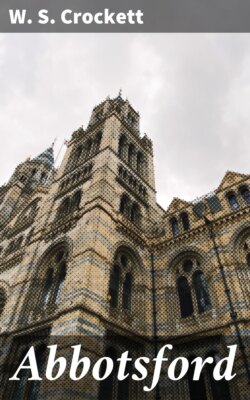Abbotsford

Реклама. ООО «ЛитРес», ИНН: 7719571260.
Оглавление
W. S. Crockett. Abbotsford
Abbotsford
Table of Contents
Preface
CHAPTER I
CHAPTER II
CHAPTER III
CHAPTER IV
CHAPTER V
CHAPTER VI
CHAPTER VII
CHAPTER VIII
CHAPTER IX
CHAPTER X
INDEX
FOOTNOTES:
Отрывок из книги
W. S. Crockett
Published by Good Press, 2019
.....
About to quit Ashestiel, therefore, his attention was directed to a small farm-holding not far distant, on the south bank of the Tweed, some two miles from Galashiels, and about three from Melrose. Scott knew the spot well. It had 'long been one of peculiar interest for him,' from the incident mentioned in the foregoing chapter. By name Newarthaugh—a name almost forgotten in the story of Abbotsford—it was also known as Cartleyhole, or Cartlawhole, and Cartlihole, according to the Melrose Session Records, in which parish it was situated. The place was tenanted for a time by Taits and Dicksons. Then it seems to have passed into the family of Walter Turnbull, schoolmaster of Melrose, who disposed of it, in the year 1797, to Dr. Robert Douglas, the enterprising and philanthropic minister of Galashiels. Why Dr. Douglas purchased this property nobody has been able to understand. It lay outside his parish, and was never regarded as a desirable or dignified possession. A shrewd man of business, however, he may, like Scott, have judged it capable of results, speculating accordingly. He had never lived at Cartleyhole. The place was laid out in parks, and the house, of which, curiously, Scott speaks in a recently recovered letter as 'new and substantial,' was in occupation. The surroundings were certainly in a deplorably neglected condition. The sole attempt at embellishment had been limited to a strip of firs so long and so narrow that Scott likened it to a black hair-comb. 'The farm,' according to Lockhart, 'consisted of a rich meadow or haugh along the banks of the river, and about a hundred acres of undulated ground behind, all in a neglected state, undrained, wretchedly enclosed, much of it covered with nothing better than the native heath. The farm-house itself was small and poor, with a common kailyard on one flank and a staring barn on the other; while in front appeared a filthy pond covered with ducks and duckweed, from which the whole tenement had derived the unharmonious designation of Clarty Hole.'[3] A local reminiscence emphasizes Lockhart's description: 'The first time I saw Cartley Hole, or, as it is more appropriately called, Clarty Hole, which you are probably aware is the Scotch term for dirty, was in 1807 or 1808. I was on my first holiday visit to an uncle in Darnick. It was a low-built, one-story house, standing in what was literally a hole, and it had anything but a prepossessing appearance. It may have had attics, but of this I am not quite sure. It had nothing to recommend it as a site for a stately mansion, save its proximity to the Tweed. The scenery around was bare, and did not boast of a single natural beauty.' But to Scott's far-seeing eye matters were not so hopeless. There were, he felt, possibilities in the place. Moreover, it was his wish to create, as far as he could, the home that was to be his own. Cartleyhole offered in many respects an ideal site for the purpose he had in prospect. It lay at almost the centre of the Border district. All around were the grand historic and romantic associations of the Border, the subjects in which Scott revelled. Melrose Abbey, the most graceful and picturesque ruin in Scotland, already so celebrated in his verse, was visible from many points in the neighbourhood. Dryburgh was not far distant. Yonder Eildon's triple height, sacred to so much of the supernatural in Border lore, reared his grey crown to the skies. There, the Tweed, 'a beautiful river even here,' flowed in front, broad and bright over a bed of milk-white pebbles. Selkirk, his Sheriff's headquarters, was within easy reach. He was interested in the Catrail, or Picts' Work Ditch, on the opposite hillside, so often alluded to in his letters to Ellis; and on his own ground were fields, and mounds, and standing-stones, whose placenames recalled the struggle of 1526. A Roman road running down from the Eildons to a ford on the Tweed, long used by the Abbots, the erstwhile lords of the locality, furnished a new designation for the acres of hungry haugh-land—'as poor and bare as Sir John Falstaff's regiment'—upon which was destined to be reared the most venerated, and probably the most visited shrine in the kingdom.
.....